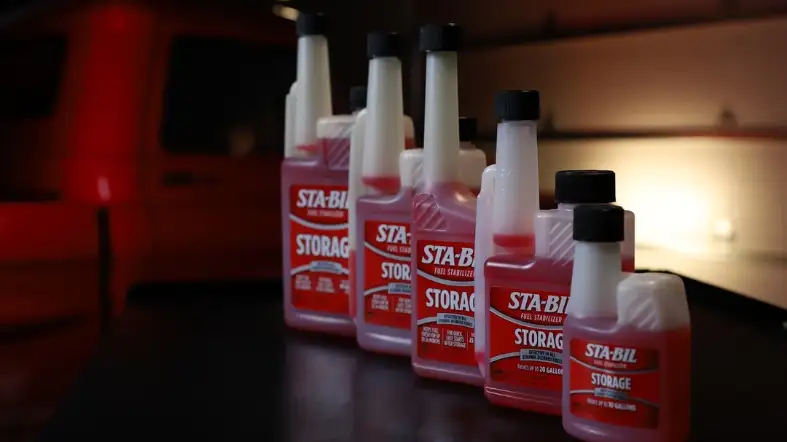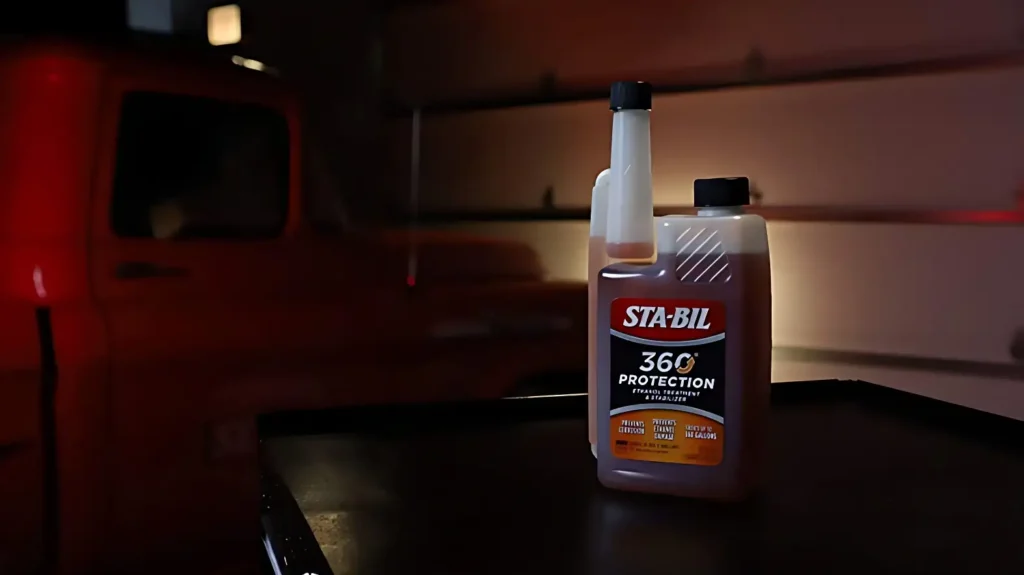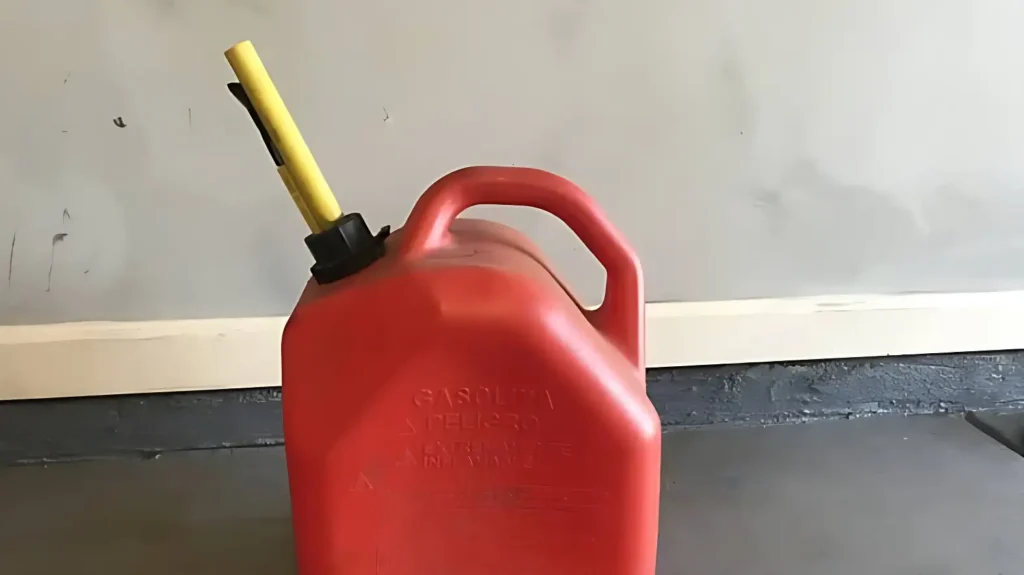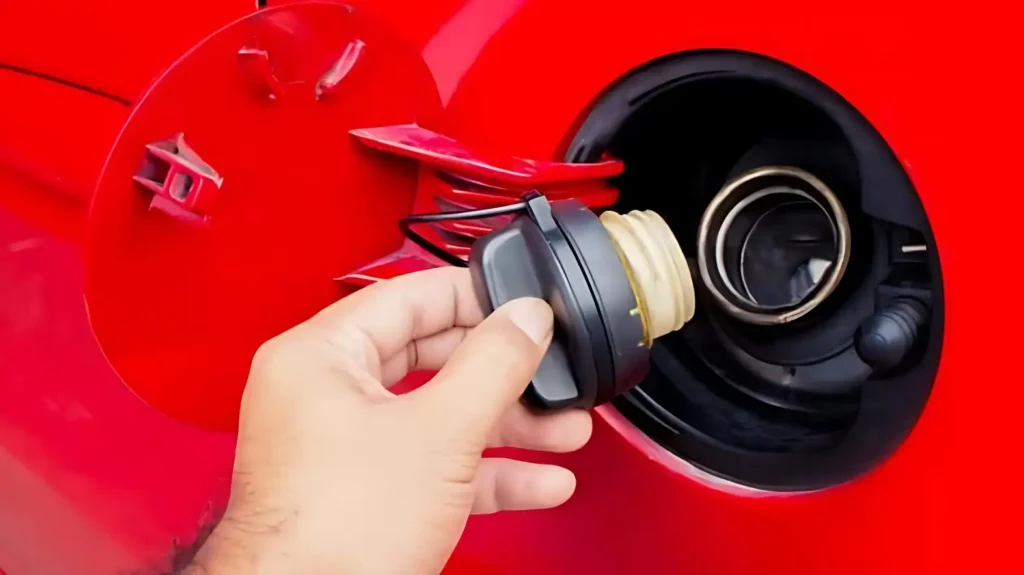If you’ve ever experienced problems with your car’s engine, it could be due to water in your gas tank.
The introduction of ethanol in gasoline has made it easier for water to get into your fuel system, causing issues such as stalling, poor acceleration, and even engine damage.
Stabil claims to remove water from gas, but does it actually work? In this blog post, we’ll investigate Stabil’s effectiveness and whether it’s worth using to keep your car running smoothly.
Does Stabil Remove Water From Gas?
Yes, Stabil can help remove water from the gas. It contains ethanol and other chemicals that can absorb water and prevent it from causing engine damage. However, it’s best to use Stabil before water contamination occurs.

Why water is a problem for gasoline?
Corrosion of metal components
Water is a corrosive agent that can damage metal components in gasoline engines.
When water mixes with gasoline, it forms a corrosive acidic solution that can cause corrosion and rusting of metal parts, such as fuel tanks, pipes, and fuel injectors.
Corrosion can weaken metal components, resulting in leaks and failures, leading to costly repairs.
Contamination of fuel
Water can also contaminate gasoline by dissolving other impurities, such as dirt, dust, and rust particles.
Contaminated gasoline can clog fuel filters, fuel lines, and injectors, reducing fuel efficiency and causing engine misfires and stalling.
Separation of gasoline and water
Gasoline and water do not mix well, and they tend to separate when they are mixed.
This separation can cause water to accumulate at the bottom of fuel tanks, where it can be drawn into the fuel system, causing engine damage.
Reduced energy output
Water has a lower energy content than gasoline, which means that when water is present in gasoline, it reduces the energy output of the fuel.
This reduction in energy output can affect engine performance, reducing acceleration, and decreasing fuel efficiency.
Increased emissions
When water is present in gasoline, it can increase emissions of pollutants, such as nitrogen oxides, carbon monoxide, and particulate matter.
These emissions can harm the environment and human health, and they can also cause engines to fail emissions tests.
Risk of engine damage
Water can cause significant damage to gasoline engines, particularly in colder climates, where water can freeze and block fuel lines, causing engine failure.
Water can also cause detonation and engine knock, which can damage pistons, bearings, and valves, leading to engine failure.
Fuel instability
Water can cause gasoline to become unstable, particularly in storage. Gasoline can break down over time, forming gums and varnishes, which can clog fuel lines and injectors. These deposits can also cause engine misfires and stalls.
How Does Stabil remove water from gas?

Here are some ways Stabil removes water from gas:
Emulsification:
When Stabil is added to gas, it emulsifies any water that may be present in the fuel.
This means that the water is broken up into tiny droplets that are suspended in the gasoline.
This makes it easier to remove the water from the tank. When you drive your vehicle, the suspended water droplets get circulated through the fuel system and eventually removed through the combustion process.
Solubilization:
In addition to emulsifying water, Stabil also solubilizes any water-soluble contaminants that may be present in the gas.
This makes these contaminants easier to remove from the tank along with the water.
Binding:
Stabil can also bind to any free water molecules in the gas. Once the water molecules are bound to the Stabil molecules, they become too heavy to remain suspended in the fuel and are removed from the tank along with the fuel through the fuel system.
Corrosion Prevention:
Water in gas can cause rust and other forms of corrosion in your fuel system.
By removing the water from the gas, Stabil helps prevent this type of damage.
This is particularly important if you store your vehicle for extended periods of time, as the fuel can sit in the tank and corrode the fuel system components.
Prevention of Engine Damage:
If water accumulates in the fuel system, it can cause serious damage to your engine.
Water can cause the fuel to ignite prematurely or not ignite at all, resulting in engine misfires and reduced performance. By removing water from the gas, Stabil helps prevent this type of engine damage.
Extended Fuel Life:
By removing water and other contaminants from gas, Stabil helps extend the life of your fuel.
Gasoline can break down over time, especially if it is stored for long periods of time.
This breakdown can lead to the formation of harmful deposits in your fuel system, which can cause engine damage.
By removing water and contaminants, Stabil helps prevent this breakdown and extends the life of your fuel.
Tips to prevent water contamination in gas
1. Store gasoline properly

Proper storage is critical to prevent water contamination in gasoline. Always store gasoline in tightly sealed containers that are designed to prevent water infiltration.
Avoid storing gasoline near any sources of heat, sparks, or flames that could cause ignition. Keep gasoline containers in a cool and dry place, away from direct sunlight.
2. Check for leaks
Gasoline storage tanks and pipes can develop leaks over time, leading to water contamination.
Regularly inspect your gasoline storage tanks, pipes, and other equipment for signs of leaks or corrosion.
If you notice any issues, immediately address them to prevent further contamination.
3. Use fuel stabilizers
Fuel stabilizers are chemical additives that can help prevent water contamination in gasoline by preventing condensation.
These additives work by reducing the vapor pressure of gasoline, which minimizes the amount of water that can enter the fuel.
Adding a fuel stabilizer to your gasoline can help maintain fuel quality and prevent engine damage.
4. Avoid filling up during or after rain
Filling up your gasoline tank during or after rain can lead to water contamination.
Water can accumulate on the ground around the gas station and mix with gasoline as it enters the tank.
Try to avoid filling up during or immediately after rain, and always check the gas pump’s nozzle for signs of water or other contamination.
5. Keep fuel tanks full
Keeping your fuel tanks full can help prevent water contamination by reducing the amount of air in the tank.
When gasoline tanks are low, there is more space for air, which can lead to condensation and water infiltration.
Therefore, it’s a good practice to keep your fuel tanks as full as possible to prevent water contamination.
6. Install water separators
Water separators are devices that can remove water from gasoline by separating the two liquids.
Installing a water separator in your fuel system can help prevent water contamination and maintain fuel quality.
These devices are relatively inexpensive and easy to install, making them a cost-effective solution for preventing water contamination.
7. Regularly replace fuel filters
Fuel filters are designed to remove contaminants from gasoline, including water. Regularly replacing fuel filters can help prevent water contamination in gasoline and maintain engine performance.
Most manufacturers recommend replacing fuel filters every 10,000 to 15,000 miles, but check your owner’s manual for specific recommendations.
8. Keep your vehicle well-maintained
Regular vehicle maintenance can help prevent water contamination in gasoline by ensuring that all components are working correctly.
Properly functioning fuel pumps, lines, and other components can help prevent water infiltration and maintain fuel quality.
Regular tune-ups, oil changes, and other maintenance tasks can help keep your engine running smoothly and prevent water contamination.
9. Use high-quality gasoline
Using high-quality gasoline can help prevent water contamination by reducing the risk of impurities and contaminants.
Always buy gasoline from reputable gas stations and brands that are known for their quality.
Avoid buying gasoline from low-priced or unfamiliar brands, as they may be more likely to contain contaminants.
10. Be aware of warning signs
Finally, it’s essential to be aware of warning signs that may indicate water contamination in gasoline.
Signs of water contamination include engine sputtering, reduced fuel efficiency, and poor overall vehicle performance.
If you notice any of these warning signs, immediately stop driving and have your vehicle inspected by a qualified mechanic.
Symptoms Of Engine Problems Caused By Water In Gas

Here, we will discuss the details and points to look out for when experiencing engine problems caused by water in gas.
1. Difficulty Starting Your Car:
One of the most common symptoms of water in gas is difficulty starting your car.
When there is water in your car’s gas tank, it can prevent the fuel from igniting, which can make starting the car difficult.
In some cases, the car may start but stall almost immediately.
2. Rough Idle:
If your car starts but is not running smoothly, it could be a sign of water in gas.
The water can prevent the fuel from being evenly distributed in the engine, causing a rough idle. This can lead to the car shaking or vibrating while idling.
3. Misfiring Engine:
Water in gas can also cause your engine to misfire. When there is water in the fuel, it can cause the engine to misfire, which can lead to a decrease in power and acceleration.
This can be dangerous if you are driving at high speeds, as you may lose power and control of the vehicle.
4. Poor Fuel Economy:
Water in gas can also have an impact on your car’s fuel economy. The water can dilute the fuel, which can lead to decreased fuel efficiency.
This means that you may have to fill up your tank more frequently, which can be costly in the long run.
5. Check Engine Light:
If you notice that your check engine light has come on, it could be a sign of water in gas. The check engine light can come on for a variety of reasons, including issues with the fuel system.
If you have recently filled up your tank and notice that the check engine light has come on, it could be a sign of water in gas.
6. Corrosion:
Water in gas can also cause corrosion to your car’s fuel system. The water can react with the metal components in the fuel system, causing rust and corrosion.
This can lead to leaks and other issues, which can be expensive to repair.
7. Strange Noises:
If you hear strange noises coming from your car’s engine, it could be a sign of water in gas.
The water can cause the fuel to burn unevenly, which can lead to strange noises like popping or hissing.
8. Smell of Gas:
If you notice a strong smell of gas coming from your car, it could be a sign of water in gas.
The water can cause the fuel to evaporate, which can lead to a strong smell of gas in and around your car.
9. Stalling:
Water in gas can also cause your car to stall while driving. This can be dangerous, especially if you are driving at high speeds.
If you notice that your car is stalling while driving, it is important to have it inspected immediately.
10. Prevention:
Prevention is key when it comes to engine problems caused by water in gas.
One way to prevent water in the gas is by avoiding filling up your car’s gas tank during or after heavy rainfall.
This is because water can enter the gas tank through the fuel cap, which can lead to engine problems.
FAQs
Is It Safe To Use Stabil In My Vehicle?
Yes, Stabil is safe to use in any vehicle that runs on gasoline or diesel fuel.
It is designed to help protect your engine and ensure that it runs smoothly, even in harsh weather conditions.
How Often Should I Use Stabil In My Vehicle?
It is recommended that you use Stabil each time you fill up your fuel tank, especially if you are using gasoline or diesel fuel that may contain ethanol or other additives.
Can Stabil Help Improve Fuel Efficiency?
Yes, by removing any water that may be present in your fuel tank, Stabil can help improve your vehicle’s fuel efficiency and reduce emissions.
Will Stabil Prevent My Engine From Starting In Cold Weather?
No, Stabil is designed to help protect your engine in all weather conditions, including cold temperatures.
In fact, it can actually help to improve cold weather starting by preventing moisture buildup in your fuel tank.
Conclusion
While Stabil is a popular fuel stabilizer that can help protect gasoline from the harmful effects of oxidation and degradation, it does not remove water from gas.
If water has entered your fuel system, it is best to drain the contaminated fuel and replace it with fresh, clean gasoline.
Preventing water contamination in the first place by using a fuel stabilizer like Stabil, storing fuel properly, and keeping gas tanks topped up.
It can help can go a long way in keeping your engine running smoothly.
